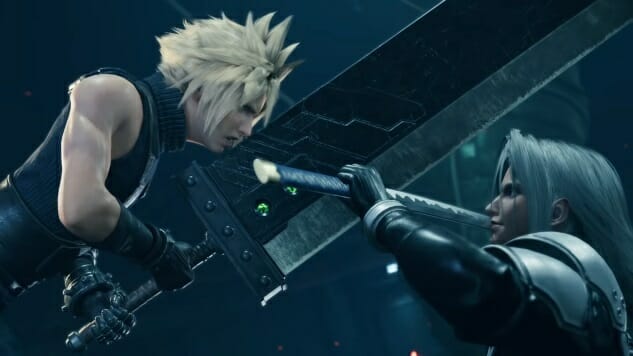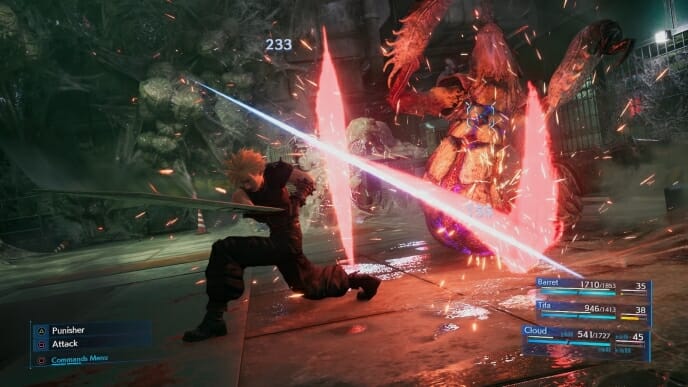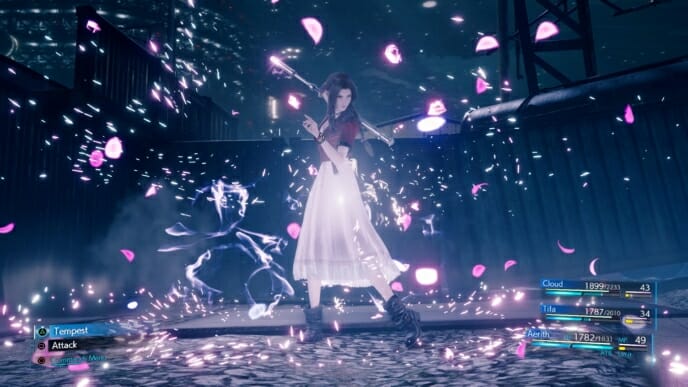Final Fantasy VII Remake Expands on a Classic—and Its Unapologetic Political Identity

Let’s just rip this Band Aid off: no, Final Fantasy VII Remake can’t match the impact of the original. Not even slightly. The original Final Fantasy VII is one of the most important games of all time, setting new standards in videogame storytelling while bringing the niche RPG genre closer to the mainstream. This remake, meanwhile, doesn’t even include the full game—the infamously overstuffed Final Fantasy VII is being split into a series of remakes—and pretty much only exists for two reasons: One, to make a lot of money. And two, so today’s audience can actually experience that story without having to suffer through an archaic, unattractive game that anybody younger than 30 would immediately reject. On that second point, at least, Square Enix has pulled this off about as well as could be expected.
Even though it’s 23 years and eight Final Fantasies later (not counting the multitude of spinoffs and side-sequels), Final Fantasy VII still looms as the ultimate Final Fantasy. The biggest fans might go harder for Final Fantasy VI, but VII has a unique and rarefied position within gaming history. Its characters and plot beats still define the series—notice that the only Final Fantasy character to make it into Super Smash Bros. is Cloud Strife. More than any other pop medium, though, games aren’t really made to last—especially games from the era that spawned Final Fantasy VII. Technology keeps marching forward, and although 1997 might not seem all that long ago, it might as well be the Stone Ages when it comes to videogames. Square Enix is invested in keeping Cloud, Sephiroth and Aeris/Aerith in the public eye, but the game that introduced them is basically an off-putting relic. And hence this remake, which adapts the original into a language that younger players can understand, while expanding and tweaking some of the specific story points.
It’s important to keep this game in the public’s eye for other reasons, too. It wasn’t just the cinematic quality of the CGI cut scenes that made VII such a revelation in 1997. It’s about as openly political as games with this kind of marketing budget get, especially for that time; the heroes are ecoterrorists trying to save the environment, and one of the main villains is a massive corporation that is so big and powerful that it basically rules the world. Yeah, that might sound like any number of kids movies from the ‘80s, where a ragtag bunch of neighborhood urchins have to save the playground from the evil businessman with the slicked back hair, but VII approached it with more conviction and nuance. Again, the good guys are terrorists, and the game starts with you blowing up a de facto government installation that provides power to the city. These ideas predate our current time, but resonate more today than they did in the ‘90s, if only because everything the game disdained has become more widespread and entrenched in the time since. Final Fantasy VII wasn’t afraid to take a stand; that’s why people still talk about it decades later, and why it’s important to make it available for more people to experience in a way that makes sense.

As somebody who played the original not long after it was released (albeit usually very drunk, very late at night, after stumbling home from a bar or rock club), the remake can be a little disorienting at first. Instead of the flush of memories that hit me when I play an older game again, and the muscle memory that quickly kicks in, playing Final Fantasy VII Remake feels familiar but also new, and almost distractingly so. I recognize these people and their motivations, but not their voices or their actions, or the world that they live in. It’s like when you hear a song that lifts a recognizable melody or riff from another, but you can’t quite place where it’s from. That weird sense of deja vu passes quickly, fortunately. It could be because my memories of the original are so old and besotted, but I think it’s more because this remake quickly and clearly establishes its own identity, one that’s indebted to the past but not slavish to it.
If you’ve played the original, the broad strokes of the story will still be familiar. Square has packed it out with extravagant new details, resulting in something that feels both modern and classic. I wouldn’t call it timeless—I’m sure within 10 years it’ll feel as hopelessly tied to today as the original is to 1997—but it’s the right fit for today.
-

-

-

-

-

-

-

-

-

-

-

-

-

-

-

-

-

-

-

-

-

-

-

-

-

-

-

-

-

-

-

-

-

-

-

-

-

-

-

-









































